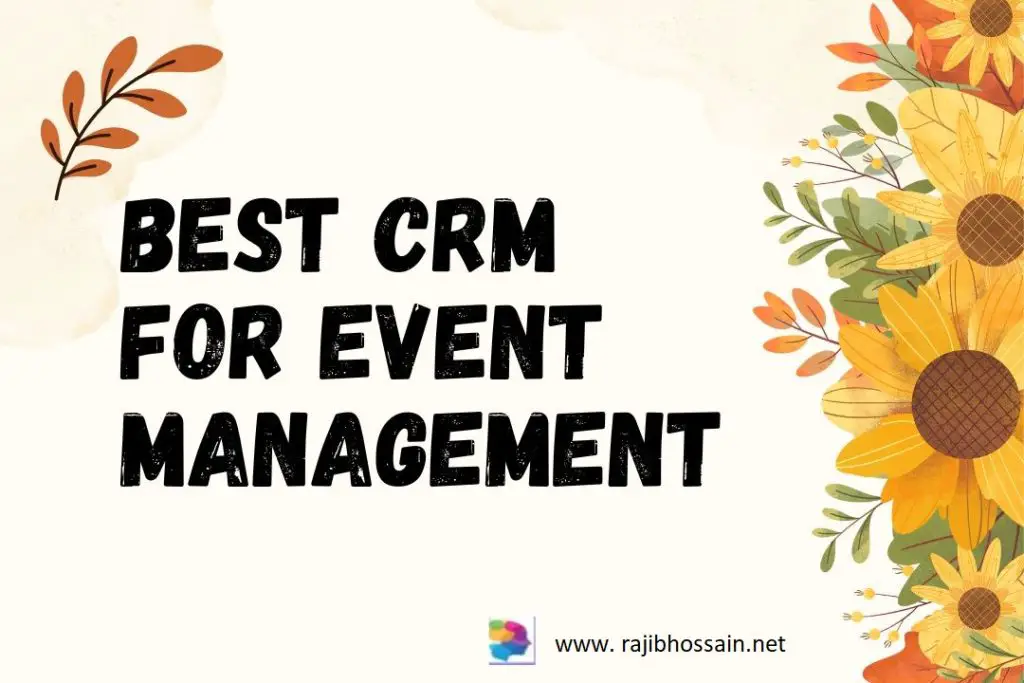
Event management involves coordinating multiple tasks and stakeholders to ensure a successful event. A robust Customer Relationship Management (CRM) system can help streamline these processes, enhance attendee engagement, and provide valuable insights. This article explores the best CRMs for event management, helping you choose the right tool to boost your event planning and execution.
Key Features of a CRM for Event Management
When selecting a CRM for event management, consider the following essential features:
- Attendee Management: Ability to manage attendee information, registrations, and preferences.
- Communication Tools: Tools to facilitate communication with attendees, sponsors, and vendors through email, SMS, and social media.
- Automation: Automate tasks such as ticketing, follow-ups, and reminders.
- Analytics and Reporting: Advanced analytics to track event performance, attendee engagement, and other key metrics.
- Integration: Seamless integration with event management software and other business tools.
- Customization: Ability to tailor workflows and processes to meet the specific needs of your events.
Top CRMs for Event Management
- Salesforce Event Management
- Overview: Salesforce offers a comprehensive CRM solution for event management, integrating seamlessly with its robust ecosystem.
- Features: Attendee management, event registration, marketing automation, and detailed analytics.
- Why It Stands Out: Salesforce’s extensive customization options and powerful integration capabilities make it ideal for large-scale events.
- Cvent
- Overview: Cvent is a leading event management platform that includes a robust CRM tailored for event planners.
- Features: Event registration, attendee tracking, communication tools, and analytics.
- Why It Stands Out: Cvent’s focus on event management and its comprehensive feature set make it a top choice for professional event planners.
- Eventbrite
- Overview: Eventbrite offers a user-friendly platform for event management, suitable for events of all sizes.
- Features: Ticketing and registration, attendee management, email marketing, and reporting.
- Why It Stands Out: Its simplicity and ease of use make Eventbrite a popular choice for small to mid-sized events.
- HubSpot CRM
- Overview: HubSpot CRM provides a versatile solution for event management, with a focus on marketing and attendee engagement.
- Features: Contact management, email marketing, workflow automation, and detailed reporting.
- Why It Stands Out: HubSpot’s comprehensive marketing tools and user-friendly interface enhance its value for event planners.
- Zoho CRM
- Overview: Zoho CRM offers a flexible and affordable solution for event management, suitable for businesses of all sizes.
- Features: Attendee management, email marketing, workflow automation, and comprehensive analytics.
- Why It Stands Out: Zoho CRM’s affordability and extensive customization options make it a great choice for event planners looking to tailor their CRM to specific needs.
Benefits of Using a CRM in Event Management
Implementing a CRM in your event management operations offers numerous benefits:
- Improved Attendee Experience: Personalized communication and timely follow-ups enhance attendee satisfaction.
- Streamlined Planning: Automation of tasks such as ticketing and reminders ensures a smooth and efficient event planning process.
- Centralized Data Management: All attendee information is stored in a central location, making it easy to access and manage.
- Better Insights: Advanced analytics provide valuable insights into event performance and attendee engagement, helping to identify areas for improvement.
- Increased Efficiency: Automating routine tasks frees up your team to focus on more complex event-planning activities.
Conclusion
Choosing the best CRM for event management can significantly impact your ability to plan and execute successful events. Whether you opt for Salesforce’s comprehensive features, Cvent’s event management focus, or Eventbrite’s user-friendly platform, the right CRM will help you streamline your event planning processes and enhance the overall experience for attendees.
FAQs
Q1: Is a CRM system necessary for small event management businesses?
- A: While not essential, a CRM system can significantly improve client management, communication, and operational efficiency, even for small businesses.
Q2: How do CRMs ensure client data security?
- A: CRMs for event management are designed to comply with data protection regulations, featuring robust encryption, access controls, and regular security audits.
Q3: Can a CRM system integrate with existing event management software?
- A: Many CRMs offer integration capabilities with popular event management software such as ticketing and registration systems, ensuring seamless data transfer and workflow.
Q4: What are the initial steps to implement a CRM in an event management business?
- A: Identify your business’s specific needs, choose a CRM that meets those needs, train staff on its use, and gradually integrate it into your daily operations.
